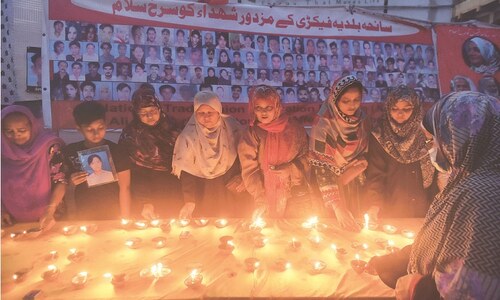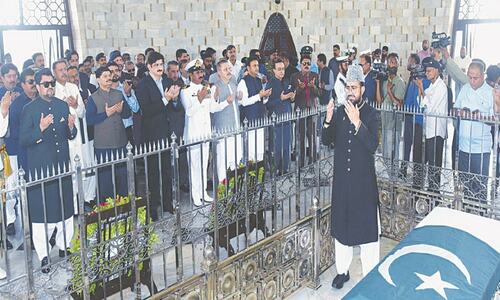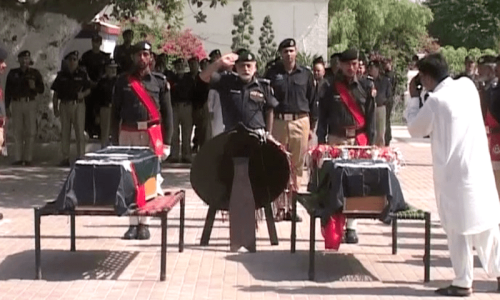KARACHI, April 15: In a dialogue on the role of the Pakistani diaspora in the west, the panelists and the participants disagreed on the western role, terming it from being “confused in how to deal with political Islam” to being responsible for “social engineering” in Muslim countries and creating the Frankenstein of “jihadis” and following the policy of “double standards” when dealing with the Muslim world.
The participants also emphasized the need for the west to exercise more “soft power” in dealing with the Muslims, including the Pakistani diaspora. The participants agreed only on one point that the Pakistani diaspora in western societies needed to “do more.”
They tended to agree on the point that extremism was an offshoot of the unresolved problems like that of Kashmir, Palestine, Iraq and Afghanistan, left by the former western colonial powers, which fuelled extremism.
The dialogue was organised by the Pakistan Institute of Legislative Development and Transparency (PILDAT) as part of an exercise in understanding relations between the Muslim world and the west.
Legislators of Pakistani origin from the UK and Norway engaged in an animated conversation with local intellectuals, academics and legislators on the topic of “Pakistani diaspora in the west: part of the solution or part of the problem”.
Panelists included Baroness Kishwer Falkner of Margravine (member of the British House of Lords) and Khalid Mahmood, (member of Storting Norwegian Parliament) in addition to retired Lt-Gen Moinuddin Haider, Ghazi Salahuddin, Huma Baqai, Shazia Marri and Dr Meraj-ul-Huda Siddiqui.
Ahmed Bilal Mehboob, executive director of PILDAT, introduced the topic and explained that the dialogues would be held in Lahore and Islamabad on April 16 and 17, respectively.
Initiating the dialogue, Ghazi Salahuddin said that the Pakistani diaspora was part of the problem that emanated from Pakistan. The Muslim world suffered from intellectual deficit and it was unfair that the Muslim world judged itself by its lofty ideals and goals and denounced the west by its actions.
Dr Meraj-ul-Huda Siddiqui of the Jamaat-i-Islami said the Pakistani diaspora was unable to play any role or depict a ‘Muslim, Pakistani’ picture. The Pakistani diaspora lacked the identity needed to play a role in beginning a dialogue with the west, he said, adding that more powerful players in this dialogue needed to accept the minorities without seeking to alter their cultures and traditions. Referring to the scarf issue, he emphasized that the west should not seek to “melt every Muslim into its cultural pot”.
Elected six times in the local council since 1983 and now in the Norwegian Parliament, Chaudhry Khalid Mahmood said the Pakistani diaspora experienced different realities in different countries. The Pakistani community had played an important role in determining Islam and Pakistan’s status in Europe, which was different from their role in the US and Canada.
Responding to a question, Mr Mehmood said that numerous terrorist attacks within the UK by non-Muslims had not been associated by the media with religion as was done in Muslims’ case.
The west was not entirely free of blame. The first time the global Islamic identity was propagated was during the Soviet war at the behest of the US and its allies. The west needed to change its attitudes and accept blame in this context, he said.
Moinuddin Haider said that the Pakistani diaspora had come into a sharper focus after 9/11. After 7/7, Pakistanis in the United Kingdom were associated with the attacks immediately without any investigation or solid proof. He said the invasion of Iraq and Afghanistan was unjustified. The Pakistani diaspora also suffered from biased propaganda and coverage in the western media.
He said he believed that the Pakistani diaspora needed to ensure that the means they used to propagate their views were non-violent. He said Pakistani politics should not be taken to other countries and the diaspora should take part in local politics of the host countries.
He accused a section of the western media of a biased propaganda and coverage, painting a distorted image of the Pakistanis.
Huma Baqai said that the geo-strategic position of Pakistan was an important factor in determining its policies. There was no representation of Pakistani side’s story from Pakistani authors and academicians. There was a revival of political Islam and the wider audiences in the west had to be made aware of it, she said, adding that militancy was a reaction to the west’s double standards and had to be addressed in that context.
Baroness Kishwer Falkner said that the Pakistani diaspora had the potential of being part of the solution, although it was not trying hard enough. Integration had been painfully slow in the UK. There was a perception in the west that the problems in the Muslim world were extrapolated and taken to the west to be fought there, such as Kashmir, Palestine, Iran and Iraq. The diaspora had the option to use the democratic options available to them to change what they disliked but preferred the violent option over the peaceful, democratic one. She said there was no such thing in the globalised world as one identity anymore, but people had multiple identities.
Baroness Kishwer Faulkner claimed that the first generation minority communities in the UK lived parallel lives, hanging on to cultural values even when incompatible with successful integration in the adopted communities such as forced marriages. From a western perspective, the issues of the Muslim countries (such as the Kashmir dispute, the 1971 war between Pakistan and India as well as its conflict with Bangladesh) had been extrapolated to the west and were being played out in the western countries.
The Muslim world had to sort out the issues of authoritarian regimes itself, the west could play little role in resolving these issues. The west continued to engage militant organizations such as Hamas to find a solution to Political Islam and militancy, she said.
Information Minister of Sindh Shazia Marri said that interaction with the local communities in which diaspora lived was important in their integration in host countries. She said the west had double standards with respect to Muslim countries and needed to stop supporting dictatorial regimes if it wanted to rid itself of the “double-standards” charge by the Muslim World.
“Pakistanis have been largely anti-west during the last few years, which has not been reflected in the policies of the government of Pakistan. The problems of Pakistanis have to be analyzed in full with attention to prevalent extreme poverty,” she said.
Dr Khalida Ghaus said statements such as “bomb the Islamic societies and restructure them” only reinforced these views. There was a need for dialogical reasoning in addition to dialogue. Similarly, it was unfair to study the integration issues in the aftermath of 9/11. “The slow evolution of the present conflict goes back much further. Absence of democracy might be a reason, but is not the sole answer for societies to develop,” she said.
The west had played a significant role in formation and restructuring of Muslim societies, including Afghanistan and Iraq.
A participant pointed out that after the collapse of the Soviet Union, the west needed a punching bag, a role played by Muslims now. He said that preventing Turkey’s entry into the European Union was reflective of the west’s bias and double standards.
It was maintained that extremists existed in all the societies and therefore their labeling as a problem in the west was not correct.
Arif Jatoi said the British created the present problems in the form of Kashmir, in the Middle-East and, therefore, the assertion that the west was not sure of its role in solving the same was not valid. The second, third and fourth generation westerners of Pakistani origin faced an identity crisis at the moment.
Nissar Effendi said that the Taliban were created with the funding of the western countries and a good number of alleged corrupt Pakistanis had moved to the west.
It was, therefore, suggested that intellectuals among the Pakistani diaspora had to be given prominence by the media and this face of the diaspora had to be brought forward. A plural and secular society could be a solution to the existing societies.














































Dear visitor, the comments section is undergoing an overhaul and will return soon.